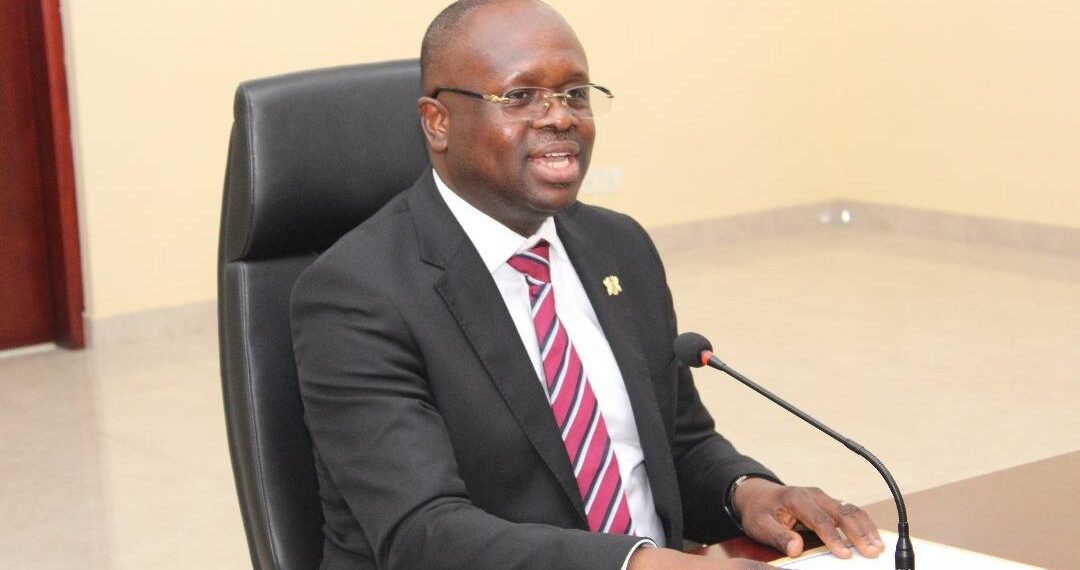In what appears to be a major step towards dismantling the networks behind Ghana’s destructive illegal mining industry, popularly known as galamsey, Minister of Defence Dr. Edward Omane Boamah has announced that security authorities have secured key evidence to trace and prosecute the owners of excavators used in illegal mining.
Writing under the headline “Going After the Owners of Galamsey Excavators”, Dr. Omane Boamah disclosed that the Ghana Police Service, in collaboration with the Ghana Armed Forces and other state agencies, has successfully obtained chassis numbers of heavy-duty earth-moving equipment seized during recent anti-galamsey operations.
These operations, he noted, were carried out in multiple regions with the help of the Forestry Commission and the Police Service.
The seized chassis numbers—essentially the vehicle identity codes of the excavators, according to the Defense Minister are now being used as the linchpin in a tracing mechanism aimed at unmasking the so-called “big people” behind the operations.

According to Dr. Omane Boamah, this approach marks the beginning of a decisive phase in the fight against galamsey—one that targets not just the small-scale operators at mining sites, but also the financiers, importers, and facilitators at the top of the chain.
“Who imported the excavators? Who bought them? For what purpose? Why are they being used for galamsey? More questions than answers!”
Dr Edward Omane Boamah, Ghana’s Minister of Defence
Dr. Boamah stated, clearly signaling the government’s intention to investigate beyond the surface of illegal mining operations.
He characterized the activity as “an environmental sin against humanity and God,” underscoring the moral and ecological urgency of the issue.

Mahama’s Root and Branch Approach
This strategic turn in the anti-galamsey fight is being touted as a fulfillment of the promise made by President John Dramani Mahama to tackle the menace through a “root and branch approach.”
As Commander-in-Chief of the Ghana Armed Forces, President Mahama is said to have directed a series of coordinated operations involving the military and civilian law enforcement to reclaim forest reserves and river bodies ravaged by illegal mining.

The destruction of river bodies like the Pra, Ankobra, and Offin, as well as the deforestation of protected reserves, has become a national emergency—one that threatens food security, biodiversity, and millions’ access to clean water.
The new strategy—focusing on contact-tracing the real owners of excavators— is likely to be welcomed by environmental advocates and civil society groups who have long criticized previous efforts as reactive and cosmetic.
Many believe that unless the supply chain and financial backbone of the galamsey industry are dismantled, no amount of military or police raids will bring lasting change.
Dr. Omane Boamah’s announcement of this targeted crackdown thus comes at a critical time and raises hopes that the government may finally be adopting a sustainable and intelligence-led strategy.
By tracking excavator chassis numbers, the authorities are effectively moving from field-level enforcement to supply-chain accountability—an approach that may expose collusion among certain business owners, officials, and political actors.
Critics of past administrations have pointed out how state machinery was often used to protect perpetrators of illegal mining rather than confront them.
Seized excavators mysteriously vanished from custody, prosecutions stalled, and political will seemed to fade just as public outrage peaked.

Dr. Omane Boamah’s recent remarks seem to acknowledge these past failures and hint at a break with that precedent.
While many await concrete action beyond words, Dr. Omane Boamah’s statement represents one of the clearest signals yet that the Mahama administration intends to reframe the fight against illegal mining—not as a seasonal campaign for political optics, but as a systemic intervention grounded in accountability and transparency.
If this new trajectory holds, and the investigations bear fruit, Ghana may be inching closer to breaking the decades-old grip of galamsey on its environment, economy, and politics.
READ ALSO: Ghanaian Mining Firms Have Capacity to Mine – Minerals Commission



















